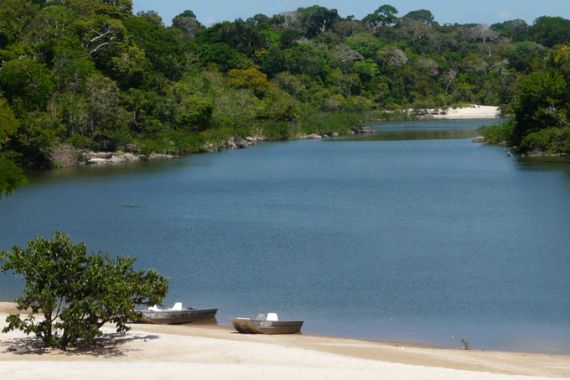Controversial forest code vetoed in Brazil
President rejects parts of bill regulating how much land farmers in Amazon and threatened areas must preserve as forest.

Brazilian President Dilma Rousseff has rejected divisive elements of a new law that would have relaxed the forest cover farmers must preserve on their land.
The president used a line-item veto on Friday to send back parts of the congressional bill in what the government said was an effort to prevent further deforestation of the Amazon.
Keep reading
list of 4 itemsAfter the Hurricane
World’s coral reefs face global bleaching crisis
Why is Germany maintaining economic ties with China?
The announcement was made by Brazil’s environmental minister Izabella Teixeira, during a joint press conference with agriculture minister Jorge Mendes Ribeiro and rural development minister Gilberto Jose Vargas.
“There was a partial veto, out of respect to the Congress and democracy,” Teixeira said.
“The vetoes included removing anything that could avoid restoring damaged environmental areas.”
Mendes and other officials said the government made 12 vetos and 32 other alterations to the bill, including a requirement for large landowners to reforest land they had illegally cleared, with less stringent requirements on smaller farms.
Government officials said the partial veto went far enough to keep Brazil on track in its efforts to quell the destruction of the Amazon and other threatened ecosystems.
Veto campaign
New elements introduced by the lower house’s farming lobby last month could have significantly softened mandatory forest coverage requirements, a prospect that sparked demonstrations as well as a “Veto it, Dilma” campaign on social media networks.
“All of the principles in the government’s proposal have been restored,” Teixeira said. “There will be no amnesty”.
The forest code will continue to require that growers maintain forest coverage equating to 20 per cent of the farm’s
area in much of the southeast, 35 per cent in Savannah areas and 80 per cent in the hot and humid Amazon.
Rousseff’s changes put the onus on larger-scale farmers to replace a larger portion of their missing forest cover, while there would be a sliding scale for small properties, which Teixeira said were less able to spare land for forest cover.
Rousseff has long indicated she wanted a bill that was less rigorous for smaller, poor farmers and ranchers in the Amazon and elsewhere.
But environmentalists, including Greenpeace and the World Wildlife Fund (WWF) had called for a complete veto of the entire bill, saying any weakening of the law could provide incentives for further illegal deforesting by letting off those who have cleared land until now without authorisation and by requiring a lesser amount be restored.
The groups, who question the government’s ability to enforce the provisions of the bill, also said details of numerous changes she has made have yet to be made public.
“President Rousseff’s statement today creates an uncertain future for Brazilian forests, considering the Congress could
still cut forest protections even further,” said Jim Leape, WWF’s international director general.
Environment summit
The bill now goes back to Congress, where legislators have 30 days to override Rousseff’s changes with a simple majority, which is considered unlikely.
Rousseff’s veto comes ahead of the Rio+20 summit by the United Nations on sustainable development in Rio de Janeiro.
Al Jazeera’s Gabriel Elizondo, reporting from Sao Paulo, said that the partial veto had given Rousseff room for manoeuvre, but left few of those party to the bill happy.
“What Rousseff is going to be able to say to [world leaders at the Rio+20 summit] now is that I vetoed parts of a bill that would have led to more deforestation in my country, but at the same time she will also be able to go to the very powerful agricultural lobby here in Brazil that makes up about 25 per cent of the Congress, and tell them that I understand your concerns and I want to work with you on this forest code bill,” he said.
“But clearly nobody on either side of the issue is completely satisfied with this partial veto. Environmentalists have been putting extreme pressure on Rousseff in the last few months telling her to veto the entire bill.
“That clearly did not happen, the agricultural interests on the other side of the debate were hoping she would sign the whole thing, and then immediately it would go into law. That did not happen either.”